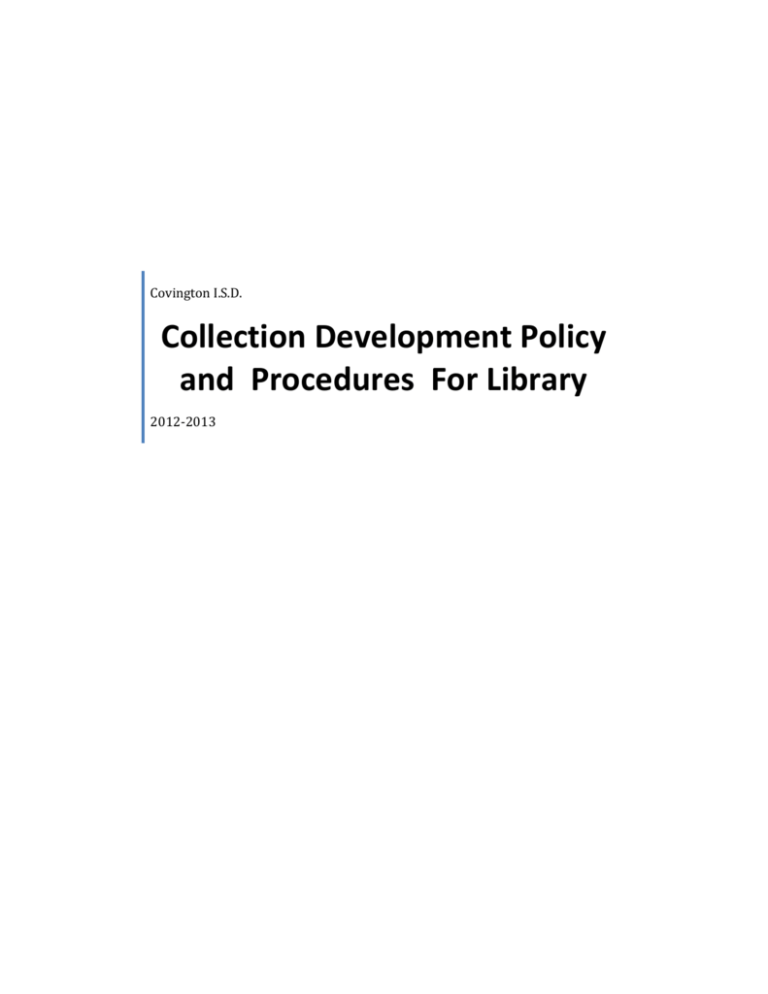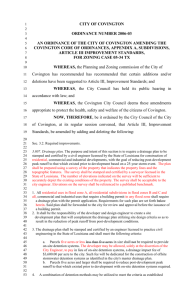Covington Library Policy - Covington Independent School District
advertisement

Covington I.S.D. Collection Development Policy and Procedures For Library 2012-2013 Covington I.S.D. 2 Collection Development Policy and Procedures For Library Table of Contents STATEMENT OF POLICY .......................................................................................................... 4 1.1 INTRODUCTION 1.2 PURPOSE OF POLICY 1.3 MISSION STATEMENT OF COVINGTON I.S.D 1.4 MISSION STATEMENT OF LIBRARY COMMUNITY SERVED ............................................................................................................ 4 FORMAL PROCEDURES FOR COLLECTION DEVELOPMENT ....................................................... 5 3.1 EXISTING COMMITTEES 3.2 ADVISORY BOARDS 3.3 COLLECTION DEVELOPMENT LIBRARIANS 3.4 SCHOOL BOARD 3.5 BOARD OF TRUSTEES 3.6 NEEDS ASSESSMENT ACTIVITIES WITH PATRONS 3.7 GUIDELINES FOR PATRON PARTICIPATION FORMATS INCLUDED IN THE CURRENT COLLECTION & NEEDED .............................................. 6 4.1 ANALYSIS OF COLLECTION STRENGTHS AND WEAKNESSES 4.2 PLANS FOR INCLUSIONS OF NEW FORMATS, SUBJECTS, AND/OR GENRES GUIDELINES AS TO HOW NEW MATERIAL ARE SELECTED & PURCHASED................................. 7 5.1 BUDGETARY FIGURES 5.2 APPROVAL PLANS 5.3 LIBRARY CONSORTIA 5.4 LICENSING AGREEMENT LOCATING LIST OF NEW PURCHASES ...................................................................................... 8 6.1 LIBRARY REFERENCE PROGRAM 6.2 READERS ADVISORY 6.3 INFORMATION LITERACY PROGRAMS LOCATION OF LIBRARY MATERIALS ........................................................................................ 9 POLICIES AND PROCEDURES FOR HANDLING CENSORSHIP ................................................... 10 8.1 CHALLENGED MATERIAL PROCEDURE 8.2 POLICIES AND PROCEDURES FOR HANDLING GOVERNMENT-SPONSORED INVESTIGATIONS 8.3 RECORDS RETENTION Covington I.S.D. 3 Collection Development Policy and Procedures For Library GIFTS AND EXCHANGES ....................................................................................................... 13 9.1 COLLECTION EVALUATION 9.2 DESELECTION (WEEDING) DIASTER PREPAREDNESS ..................................................................................................... 14 APPENDIX............................................................................................................................ 15 10.1 CHALLENGED MATERIAL FORM 10.2 WISH YOU HAD FORM 10.3 POLICY ON CONFIDENTIALITY OF LIBRARY RECORDS 10.4 CODE OF ETHICS OF THE AMERICAN LIBRARY ASSOCIATION 10.5 LIBRARY BILL OF RIGHTS 10.6 THE FREEDOM TO READ STATEMENT BIBLIOGRAPHY .................................................................................................................... 22 Covington I.S.D. 4 Collection Development Policy and Procedures For Library I. Statement of Policy 1.1 Introduction The Covington Independent Library stands behind the beliefs of the American Library Association’s standards and the Texas School Library Commission. It is our belief that “student achievement is the objective of school library programs.” (Commissioners) 1.2 Purpose of Policy To guide the library staff in the selection, acquisition, maintenance, procedures, and policies of the day to day operations To inform interested individuals of policies regarding privacy, procedures regarding request for considerations, and reconsideration of materials. 1.3 History of Library The Covington Independent School District has been committed to providing excellence in education to its students since it was founded in 1906. The libraries currently serve approximately 280 students consisting of grade levels Pre-Kindergarten through 12th. The current collection is housed in two separate libraries. The Staar Campus houses materials appropriate to the grade levels of Pre-K through 6th. The high school campus houses the collection for seventh through 12th. 1.4 Mission Statement of Covington I.S.D. The mission of Covington Independent School District is to graduate responsible young adults with the knowledge and skills to achieve their goals by providing a learning environment that instills values, sense of purpose and pride in our Covington owl heritage. (Covington) 1.5 Mission Statement of Library The mission of Covington Independent School District library is to assist the district in graduating responsible young adults with the skills to achieve lifelong learning behaviors. The library’s primary purpose is educational; it offers enrichment for the students and resource material for the faculty. Materials are selected from all forms of media available, based on interest, vocabulary, maturity, and ability levels of the student within Covington I.S.D. (Covington) II. Community Served The community of Covington is rural in nature and consists of small to medium-sized farms and ranches located in Hill County. The population in Covington is approximately 272. The student population is a diverse group with approximately 86 percent White, 12 percent Hispanic, and less than 3 percent others. Covington I.S.D. 5 Collection Development Policy and Procedures For Library III. Formal Procedures for Collection Development 3.1 Existing Committees The responsibility for the final selection shall be delegated to professionally trained personnel of the Library who know the course of study, the methods of teaching, and the individual differences of the students in the school which the materials are provided for. (Policy) 3.2 Advisory Boards A yearly meeting with teachers at each subject area shall meet to contribute ideas for additions to the library’s curriculum related materials. 3.3 Collection Development Librarians The collection development librarian (aka. Librarian) will have the responsibility of the final selection of materials provided by the school. 3.4 School Board The legal responsibility for the Covington I.S.D. Library rests with the School Board of Covington I.S.D. The School Board subscribes in principle to the statements of policy concerning intellectual freedom endorsed by the American Library Association and/or the American Association of School Libraries. (Appendix) 3.5 Board of Trustees Library does not fulfill specified roll. 3.6 Needs Assessment Activities with Patrons Periodically, a survey will be implemented to explore the needs and wants of the faculty and student body. The surveys will be issued by paper copy or internet survey. Teachers and students may request a title by verbal request or by filling out a wish you had card located in the library. (Appendix) 3.7 Guidelines for Patron Participation Patron Conduct o In order to ensure constructive use of library facilities, materials, and services, as well as the personal comfort of all patrons, the Covington I.S.D. Library has established the following rules. 1. Foul language, loud, and boisterous behaviors are not permitted. 2. Food and drink are not allowed in the library unless offered by the library as refreshments served at a program Covington I.S.D. 6 Collection Development Policy and Procedures For Library 3. School dress code guidelines are required for all patrons. 4. A library patron who deliberately alters a library computer database or destroys computer equipment will be subject to financial liability for damages. Loan Periods o Two weeks for books or audio books o Overnight for reference books o Books may be renewed if there is not a waiting list for the title o A three book limit can be checked out at one time at the high school level. o A two book limit can be checked out at one time at the elementary level. o One week check out for magazines plus cannot be current month’s issue. Fines and Charges o The purpose of overdue fines is not to punish the patron; it is to encourage patrons to return the items by the due date so they can be available to others. No fines for Pre-Kindergarten through 2 All books, audio books, and magazines, $0.05 per day for grades 3 through 12. All patrons will be held financially liable for replacing any unreturned items. Reserving Facilities o All requests for group reservations will be upon request of the faculty. IV. Formats Included in the Current Collection & Needed o o o o o o o o Books in hardback and paperback in fiction and nonfiction DVD/VHS Audio books/CD Periodicals-for both recreation and reference Online databases for research Reference books Local newspaper EBooks 4.1 Analysis of Collection Strengths and Weaknesses There are more than 13,000 nonfiction and fiction books housed in the combined campuses. Current needs of the collection include updating collection in all areas. The general age of the collection is 21 years. Curriculum related reference materials are in tremendous need, science, language arts, technology, history, geography, story collections, and biography on the high school level. 4.2 Plans for Inclusions of New Formats, Subjects, and/or Genres Focus will be generated toward the biography, science, and literature areas, these areas have books over the age of twenty-two years. Newly purchased material in this area will focus on the Covington I.S.D. 7 Collection Development Policy and Procedures For Library current curriculum and teacher input. Inclusion of an additional online database Additional eBooks Additional books of all genres to update collection. Focus on updating all areas of collection to the general age of 12 years. V. Guidelines as to How New Materials are Selected and Purchased Specific criteria considered are: o The material’s overall purpose and how well it fits into the current curriculum o The reputation and significance of the author, editor, illustrator, publisher, and/or producer o The material’s timeliness or permanence o The subject matter’s importance to the collection and curriculum o The material’s accurate and scholarship adequacy o The reading level and reader appeal o The quality of the writing and/or illustrations o The price in terms of other available or non-available resources within the community o The fairness of ethnic and sex-role representation o The materials selected are within the guidelines of the Covington I.S.D. Board Policy Manual. Sources to be considered in selection: o Teacher request and/or recommendation o Student requests and interest o Recommended review sources (Favorable review from at least two selection aides, such as… School Library Journal, Horn Books, Booklist, Library Media, Journal, and/or other reputable sources.) o Recommended bibliographies and award lists Subjects which are diverse are carefully considered for the library. Among these are… o Religion – factual unbiased material representing major religions of the world religions of the world may be included. Bibles and other sacred writings are acceptable. o Ideologies –basic factual, not judgmental, information on ideologies or philosophies that are of current or continuing interest should be included, based on the intended maturity level of the users. o Science –medical and scientific knowledge without any biased selection of facts and suitable to the user’s developmental stage should be included. o Sex and profanity –the fact of sexual incidents or profanity appearing in a book shall not automatically disqualify it. Overriding considerations include whether the book presents like in its true proportions, whether the book has literary merit. Factual material of an educational nature on the level of the users shall be included Covington I.S.D. 8 Collection Development Policy and Procedures For Library 5.1 Budgetary Figures The Covington I.S.D. library is funded by tax dollars as allotted by the school board. The budget for 2012-2013 was approximately $9500.00. LIBRARY BUDGET Magazines, 1% Video Stream, 9% Misc Cont., 15% Books, 21% Travel, 4% Renassons, 22% Misc., 11% Supplement, 9.0% Currently 21 percent of budget goes directly toward purchase of books. 5.2 Approval Plans The Covington I.S.D. library does not commit to any automatic shipments of book orders. Library materials shall be purchased by submitting a purchase order thorough the administration for each requested order. 5.3 Library Consortia The Covington I.S.D. library has a multi-regional Library Automation Consortium (MrLibS). This consortium must be renewed yearly in order to continue the membership in the MrLibS Consortium and the continued use of Follett Destiny. The renewal includes the annual Follett maintenance renewal for Destiny Library Manage. 5.4 Licensing Agreement All licensing agreements shall be under the policies of the Covington I.S.D. VI. Locating List of New Purchases Upon the purchase of new library material, the librarian will process all new material in a timely manner. Each new item will be marked “NEW” and placed book cover outward on shelving units for quick access for patron’s check-out, after initial check-out it will be placed in its proper location on the stacks. Covington I.S.D. 9 Collection Development Policy and Procedures For Library 6.1 Library Reference Program The librarian is able to quickly assist patrons with o Research assignments o Book selection o Database searches 6.2 Readers Advisory The Elementary and Staar Campuses participates in the Accelerated Readers Program. 6.3 Information Literacy Programs All high school English classes will have a guided tour of the library, giving valuable information about library resources, passwords, and general library skills. All second through six grade level students will have a guided tour of the library, giving valuable information about library resources, and general library skills. All pre-kindergarten to first grade level students will have a twenty minute one day a week class of library related skills throughout the year. VII. Location of Library Materials The location of materials are arranged by the Dewey Decimal system o This system is made up of ten main classes or categories, each divided into ten secondary classes or subcategories, each having ten subdivisions of its own. 000 – Computer science, information, and general works 100 – Philosophy and psychology 200 – Religion 300 – Social Sciences 400 – Languages 500 – Science and Mathematics 600 – Technology and applied science 700 – Arts and recreation 800 – Literature 900 – History and geography o In addition 92 – Biography FIC – Fiction E – Easy Fiction SC - Story Collection Covington I.S.D. 10 Collection Development Policy and Procedures For Library VIII. Policies and Procedures for Handling Censorship The Covington I.S.D. library stands behind the American Libraries Association belief of patrons’ privacy and confidentiality rights and the First Amendment of Constitution. o ALA Policy on Confidentiality of Library Records (Appendix) o ALA Code of Ethics (Appendix) o ALA Bill of Rights (Appendix) o Freedom to Read Statement (Appendix) 8.1 Challenged Material Procedure Guiding Principles o Any resident or employee of the school district may raise objection to learning resources used in a school’s educational program, despite the fact that the individuals selecting such resources were duly qualified to make the selection, followed the proper procedure, and observed the criteria for selecting learning resources. o The principal should review the selection and objection rules with the teaching staff at least annually. The staff should be reminded that the right to object to learning resources is one granted by policies enacted by the School Board. o No parent has the right to determine reading, viewing, or listening matter for students other than his or her own children. o Covington I.S.D. library supports the Library Bill of Rights, adopted by the American Library Association. (A copy of the Library Bill of Rights is attached to this policy.)(Appendix) When learning resources are challenged, the principles of the freedom to read/listen/view must be defended as well. o Access to challenged material shall not be restricted during the reconsideration process. o The major criterion for the final decision is the appropriateness of the material for its intended educational use. o A decision to sustain a challenge shall not necessarily be interpreted as a judgment or irresponsibility by the professionals involved in the original selection and/or use of the material. Procedure 1. Fill out a Request for Reconsideration of Instructional Materials form (Appendix) 2. Return this form to the campus principle 3. Campus principle submits request to superintendent 4. A review committee will be formed consisting of a. One member of the district staff b. One member of the teaching staff c. One member of the library staff d. One member of the community e. Two students of the school f. One member of the school consultative committee Covington I.S.D. 11 Collection Development Policy and Procedures For Library The review committee shall: o Examine the challenged material o Review the professional acceptance of the material o Weigh the educational value of the material as a whole not by passages from the material using the Checklist for Reconsideration of Instructional Materials (Appendix) o Prepare a written report with copies forwarded to the curriculum specialist and superintendent. o Once report is filed, they are confidential and available for examination by appropriate officials only. 8.2 Policies and Procedures for Handling Government-Sponsored Investigations The Librarian has been designated as the person responsible for handling law enforcement requests. All library staff should understand that it is lawful to refer the agent or officer to an administrator in charge of the library, and that they do not need to respond immediately to any request. A librarian should try first to call the Principal, the Assistant Principal, Superintendant, or a member of the School Board. During a visit: 1. If anyone approaches a staff member alleging to be law enforcement official requesting information, DO NOT DISCLOSE ANY INFORMATION. 2. Ask for identification and then immediately refer the agent or officer to the Librarian or office staff. Photocopy identification or take business card. 3. Librarian will meet with the agent with another colleague in attendance. 4. Ask to see the court order(s) (for example, search warrant, subpoena, National Security Letter) authorizing law enforcement. 5. If the agent does not have a court order compelling the production of records, the Librarian should explain the library’s confidentiality policy and/or state’s confidentiality law and inform the agent that users’ records are not available except when a proper court order in good form has been presented to the library. 6. If there is no court order presented the FBI and/or local law enforcement has no authority to compel cooperation with an investigation or require answers to questions (other than the name and address of the person speaking to him/her). If the agent makes an appeal to patriotism, the Librarian will explain that, as good citizens, the library staff will not respond to informal requests for confidential information, in conformity with professional ethics, First Amendment freedoms and state laws. 7. If the agent does present a court order the Librarian should immediately refer the court order the district’s legal counsel for review. Covington I.S.D. 12 Collection Development Policy and Procedures For Library If the court order is in the form of a subpoena: 1. Counsel will examine the subpoena for any legal defect including the manner in which it was served on the library, the breadth of its request, its form, or an insufficient showing of good cause made to a court. If a defect exists, counsel will advise on the best method to resist the subpoena. 2. Through legal counsel the Librarian will insist that any defect be cured before records are released and that the subpoena is strictly limited to require release of specifically identified records or documents. 3. The Counsel will require that the agent requesting the information submit a new subpoena in good form and without defect. 4. The Attorney will review the information that may be produced in response to the subpoena before releasing the information. The Librarian will follow the subpoena strictly and will not provide any information that is not specifically requested in it. 5. If disclosure is required the School District’s Attorney will draft a request to the court to enter a protective order keeping the information confidential and limiting its use to the particular case. If the court order is in the form of a search warrant: 1. Search warrants are executable immediately. However, ask to have the School District’s Counsel present before the search begins to allow counsel to examine the warrant and assure that the search conforms to the terms of the warrant. This request may not be granted. 2. Gather records identified in the warrant and present them rather than allowing non-library personnel to go through the Library’s databases or records. (Intellectual Freedom Committee, 2008) If the court order is a search warrant issued under the Foreign Intelligence Surveillance Act (FICA) (USA PATROIT ACT amendment): 1. The recommendations for a regular search warrant still apply. However, a search warrant issued by a FISA court also contains a “gag order.” That means that no person or institution served with the warrant can disclose that the warrant has been served or that records have been produced pursuant to the warrants. 2. The library and its staff must comply with this order. No information can be disclosed to any other party: including the Librarian if not present at the time the warrant is served and the patron whose records are the subjects of the search warrant. 3. The gag order does not change a library’s right to legal representation during the search. The library can still seek legal advice concerning the warrant and request that the School District’s Legal Counsel be present during the actual search and execution of the warrant. (Intellectual Freedom Committee, 2008) Covington I.S.D. 13 Collection Development Policy and Procedures For Library If the court order is a National Security Letter: 1. The procedure is the same as for a search warrant. However, a gag order applies. The School District Principal/Librarian will contact Counsel. They may request that District’s Counsel be present during the search and that the search be delayed until counsel examines the court document. If law enforcement chooses to proceed, the Library must comply. It is only through continued public confidence in the fact that these guidelines are being upheld that the public can maintain its confidence in the public library. (Intellectual Freedom Committee, 2008) 8.3 Records Retention This library current policy will conform to state guidelines for retention of records. o Internet signup sheets – one week o Patron circulation records – Three weeks if resolved o Incident reports (patron) – Permanently (Intellectual Freedom Committee, 2008) IX. Gifts and Exchanges Gifts may be accepted on a base by base decision made by the librarian. 9.1 Collection Evaluation In order to maintain an up-to-date materials collection, the Covington library personnel will continually evaluate the collection according to the following criteria: o Thorough knowledge of the current collection. o Thorough knowledge of changing curriculum. o Changing needs of the school community o Consultation of reputable selection aids and other appropriate sources o Removal of materials according to weeding policy 9.2 Deselection (Weeding) Weeding is an ongoing process. Criteria to aide in the deselection process… o Duplicates o Unsolicited and unwanted gifts o Obsolete books, especially science o Supersede editions o Books with small print, brittle paper, and missing pages o Unused, unneeded volumes of sets o Periodical with no indexes Goals for weeding are to maintain an average collection age no older than twelve years. Covington I.S.D. 14 Collection Development Policy and Procedures For Library o Guidelines for weeding classes 000 – Computer science, information, and general works – every 5 years 100 – Philosophy and psychology – every 5 years 200 – Religion – every 5 years 300 – Social Sciences - every 3 years 400 – Languages – every 5 years 500 – Science and Mathematics - every 2 years 600 – Technology and applied science - every 2 years 700 – Arts and recreation – every 5 years 800 – Literature – every 5 years 900 – History and geography - every 3 years 92 – Biography – every 3 years FIC – Fiction – every 5 years E – Easy Fiction – every 5 years SC - Story Collection – every 5 years X. Disaster Preparedness The Covington Library’s Disaster Preparedness coincides with the School District’s Policy to such situations. Covington I.S.D. 15 Collection Development Policy and Procedures For Library XI. Appendix 10.1 Challenged Material Form The school board of Covington ISD delegates the responsibility for selection and evaluation of library/educational resources to the school library media specialist/curriculum committee, and has established reconsideration procedures to address concerns about those resources. Completion of this form is the first step in those procedures. If you wish to request reconsideration of library resources, please return the completed form to the Covington ISD office at 501 N. Main Street Covington, TX 76636 Covington I.S.D. 16 Collection Development Policy and Procedures For Library EXHIBIT A: REQUEST FOR RECONSIDERATION OF INSTRUCTIONAL MATERIALS Name ___________________________________________ Date ____________________ Address __________________________________________________________________ City ____________________________________ State __________ Zip _______________ Phone ____________________________________________________________________ Do you represent yourself? _____ an organization? _____ (If an organization, please identify: _________________________________________________________________) Resource on which you are commenting: ____ Book ____ Magazine ____ Audio Recording ____ Textbook ____ Library Program ____ Newspaper ____ Video/DVD ____ Electronic information/network (please specify) ____ Display ____ Other ________________________________ Title _____________________________________________________________________ Author/Producer ___________________________________________________________ 1. Have you reviewed the materials in their entirety? __________ If not, please do so before completing and submitting this form. 2. To what in the material do you object? (Please be specific: cite pages, and the like) _____________________________________________________________________ 3. What do you believe might be the result of using this material? _____________________________________________________________________ 4. For what age group would you recommend this material? _____________________________________________________________________ 5. In its place, what material of equal quality would you recommend that could be used to teach similar subject matter? _____________________________________________________________________ 6. What do you believe should be done with the material in question? Remove it from the curriculum. Do not allow my child to use this material. Use it as resource material or a choice selection. Complainant signature___________________________________ Date ______________ Covington I.S.D. 17 Collection Development Policy and Procedures For Library 10.2 Wish You Had Form EXHIBT B Name: __________________________________________________________________________ Title of Requested Item: ____________________________________________________________ Author of Requested Item: _________________________________________________________ Propose of Item Requested: ________________________________________________________ 10.3 Policy on Confidentiality of Library Records The Council of the American Library Association strongly recommends that the responsible officers of each library, cooperative system, and consortium in the United States: 1. Formally adopt a policy that specifically recognizes its circulation records and other records identifying the names of library users to be confidential. (See also ALA Code of Ethics, Article III, "We protect each library user's right to privacy and confidentiality with respect to information sought or received, and resources consulted, borrowed, acquired or transmitted" and Privacy: An Interpretation of the Library Bill of Rights.) 2. Advise all librarians and library employees that such records shall not be made available to any agency of state, federal, or local government except pursuant to such process, order or subpoena as may be authorized under the authority of, and pursuant to, federal, state, or local law relating to civil, criminal, or administrative discovery procedures or legislative investigative power. 3. Resist the issuance of enforcement of any such process, order, or subpoena until such time as a proper showing of good cause has been made in a court of competent jurisdiction.1 1Note: Point 3, above, means that upon receipt of such process, order, or subpoena, the library's officers will consult with their legal counsel to determine if such process, order, or subpoena is in proper form and if there is a showing of good cause for its issuance; if the process, order, or subpoena is not in proper form or if good cause has not been shown, they will insist that such defects be cured. Adopted January 20, 1971, by the ALA Council; amended July 4, 1975; July 2, 1986. 10.4 Code of Ethics of the American Library Association As members of the American Library Association, we recognize the importance of codifying and making known to the profession and to the general public the ethical principles that guide the work of librarians, other professionals providing information services, library trustees and library staffs. Ethical dilemmas occur when values are in conflict. The American Library Association Code of Ethics states the values to which we are committed, and embodies the ethical responsibilities of the profession in this changing information environment. We significantly influence or control the selection, organization, preservation, and dissemination of information. In a political system grounded in an informed citizenry, we are members of a profession Covington I.S.D. 18 Collection Development Policy and Procedures For Library explicitly committed to intellectual freedom and the freedom of access to information. We have a special obligation to ensure the free flow of information and ideas to present and future generations. The principles of this Code are expressed in broad statements to guide ethical decision making. These statements provide a framework; they cannot and do not dictate conduct to cover particular situations. I. II. III. IV. V. VI. VII. VIII. We provide the highest level of service to all library users through appropriate and usefully organized resources; equitable service policies; equitable access; and accurate, unbiased, and courteous responses to all requests. We uphold the principles of intellectual freedom and resist all efforts to censor library resources. We protect each library user's right to privacy and confidentiality with respect to information sought or received and resources consulted, borrowed, acquired or transmitted. We respect intellectual property rights and advocate balance between the interests of information users and rights holders. We treat co-workers and other colleagues with respect, fairness, and good faith, and advocate conditions of employment that safeguard the rights and welfare of all employees of our institutions. We do not advance private interests at the expense of library users, colleagues, or our employing institutions. We distinguish between our personal convictions and professional duties and do not allow our personal beliefs to interfere with fair representation of the aims of our institutions or the provision of access to their information resources. We strive for excellence in the profession by maintaining and enhancing our own knowledge and skills, by encouraging the professional development of co-workers, and by fostering the aspirations of potential members of the profession. Adopted at the 1939 Midwinter Meeting by the ALA Council; amended June 30, 1981; June 28, 1995; and January 22, 2008. This page has long held the incorrect amendment date of June 28, 1997; the Office for Intellectual Freedom regrets and apologizes for the error. 10.5 Library Bill of Rights The American Library Association affirms that all libraries are forums for information and ideas, and that the following basic policies should guide their services. I. Books and other library resources should be provided for the interest, information, and enlightenment of all people of the community the library serves. Materials should not be excluded because of the origin, background, or views of those contributing to their creation. II. Libraries should provide materials and information presenting all points of view on current and historical issues. Materials should not be proscribed or removed because of partisan or doctrinal disapproval. III. Libraries should challenge censorship in the fulfillment of their responsibility to provide information and enlightenment. IV. Libraries should cooperate with all persons and groups concerned with resisting abridgment of free expression and free access to ideas. V. A person’s right to use a library should not be denied or abridged because of origin, age, background, or views. Covington I.S.D. 19 Collection Development Policy and Procedures For Library VI. Libraries that make exhibit spaces and meeting rooms available to the public they serve should make such facilities available on an equitable basis, regardless of the beliefs or affiliations of individuals or groups requesting their use. Adopted June 19, 1939, by the ALA Council; amended October 14, 1944; June 18, 1948; February 2, 1961; June 27, 1967; January 23, 1980; inclusion of “age” reaffirmed January 23, 1996. A history of the Library Bill of Rights is found in the latest edition of the Intellectual Freedom Manual. 10.6 The Freedom to Read Statement The freedom to read is essential to our democracy. It is continuously under attack. Private groups and public authorities in various parts of the country are working to remove or limit access to reading materials, to censor content in schools, to label "controversial" views, to distribute lists of "objectionable" books or authors, and to purge libraries. These actions apparently rise from a view that our national tradition of free expression is no longer valid; that censorship and suppression are needed to counter threats to safety or national security, as well as to avoid the subversion of politics and the corruption of morals. We, as individuals devoted to reading and as librarians and publishers responsible for disseminating ideas, wish to assert the public interest in the preservation of the freedom to read. Most attempts at suppression rest on a denial of the fundamental premise of democracy: that the ordinary individual, by exercising critical judgment, will select the good and reject the bad. We trust Americans to recognize propaganda and misinformation, and to make their own decisions about what they read and believe. We do not believe they are prepared to sacrifice their heritage of a free press in order to be "protected" against what others think may be bad for them. We believe they still favor free enterprise in ideas and expression. These efforts at suppression are related to a larger pattern of pressures being brought against education, the press, art and images, films, broadcast media, and the Internet. The problem is not only one of actual censorship. The shadow of fear cast by these pressures leads, we suspect, to an even larger voluntary curtailment of expression by those who seek to avoid controversy or unwelcome scrutiny by government officials. Such pressure toward conformity is perhaps natural to a time of accelerated change. And yet suppression is never more dangerous than in such a time of social tension. Freedom has given the United States the elasticity to endure strain. Freedom keeps open the path of novel and creative solutions, and enables change to come by choice. Every silencing of a heresy, every enforcement of an orthodoxy, diminishes the toughness and resilience of our society and leaves it the less able to deal with controversy and difference. Now as always in our history, reading is among our greatest freedoms. The freedom to read and write is almost the only means for making generally available ideas or manners of expression that can initially command only a small audience. The written word is the natural medium for the new idea and the untried voice from which come the original contributions to social growth. It is essential to the extended discussion that serious thought requires, and to the accumulation of knowledge and ideas into organized collections. We believe that free communication is essential to the preservation of a free society and a creative culture. We believe that these pressures toward conformity present the danger of limiting the range and variety of inquiry and expression on which our democracy and our culture depend. We believe that every American community must jealously guard the freedom to publish and to circulate, in order to preserve its own freedom to read. We believe that publishers and librarians have a profound responsibility to give Covington I.S.D. 20 Collection Development Policy and Procedures For Library validity to that freedom to read by making it possible for the readers to choose freely from a variety of offerings. The freedom to read is guaranteed by the Constitution. Those with faith in free people will stand firm on these constitutional guarantees of essential rights and will exercise the responsibilities that accompany these rights. We therefore affirm these propositions: 1. It is in the public interest for publishers and librarians to make available the widest diversity of views and expressions, including those that are unorthodox, unpopular, or considered dangerous by the majority. Creative thought is by definition new, and what is new is different. The bearer of every new thought is a rebel until that idea is refined and tested. Totalitarian systems attempt to maintain themselves in power by the ruthless suppression of any concept that challenges the established orthodoxy. The power of a democratic system to adapt to change is vastly strengthened by the freedom of its citizens to choose widely from among conflicting opinions offered freely to them. To stifle every nonconformist idea at birth would mark the end of the democratic process. Furthermore, only through the constant activity of weighing and selecting can the democratic mind attain the strength demanded by times like these. We need to know not only what we believe but why we believe it. 2. Publishers, librarians, and booksellers do not need to endorse every idea or presentation they make available. It would conflict with the public interest for them to establish their own political, moral, or aesthetic views as a standard for determining what should be published or circulated. Publishers and librarians serve the educational process by helping to make available knowledge and ideas required for the growth of the mind and the increase of learning. They do not foster education by imposing as mentors the patterns of their own thought. The people should have the freedom to read and consider a broader range of ideas than those that may be held by any single librarian or publisher or government or church. It is wrong that what one can read should be confined to what another thinks proper. 3. It is contrary to the public interest for publishers or librarians to bar access to writings on the basis of the personal history or political affiliations of the author. No art or literature can flourish if it is to be measured by the political views or private lives of its creators. No society of free people can flourish that draws up lists of writers to whom it will not listen, whatever they may have to say. 4. There is no place in our society for efforts to coerce the taste of others, to confine adults to the reading matter deemed suitable for adolescents, or to inhibit the efforts of writers to achieve artistic expression. To some, much of modern expression is shocking. But is not much of life itself shocking? We cut off literature at the source if we prevent writers from dealing with the stuff of life. Parents and teachers have a responsibility to prepare the young to meet the diversity of experiences in life to which they will be exposed, as they have a responsibility to help them learn to think critically for themselves. These are affirmative responsibilities, not to be discharged simply by preventing them from reading works for which they are not yet prepared. In these matters values differ, and values cannot be legislated; nor can machinery be devised that will suit the demands of one group without limiting the freedom of others. Covington I.S.D. 21 Collection Development Policy and Procedures For Library 5. It is not in the public interest to force a reader to accept the prejudgment of a label characterizing any expression or its author as subversive or dangerous. The ideal of labeling presupposes the existence of individuals or groups with wisdom to determine by authority what is good or bad for others. It presupposes that individuals must be directed in making up their minds about the ideas they examine. But Americans do not need others to do their thinking for them. 6. It is the responsibility of publishers and librarians, as guardians of the people's freedom to read, to contest encroachments upon that freedom by individuals or groups seeking to impose their own standards or tastes upon the community at large; and by the government whenever it seeks to reduce or deny public access to public information. It is inevitable in the give and take of the democratic process that the political, the moral, or the aesthetic concepts of an individual or group will occasionally collide with those of another individual or group. In a free society individuals are free to determine for themselves what they wish to read, and each group is free to determine what it will recommend to its freely associated members. But no group has the right to take the law into its own hands, and to impose its own concept of politics or morality upon other members of a democratic society. Freedom is no freedom if it is accorded only to the accepted and the inoffensive. Further, democratic societies are more safe, free, and creative when the free flow of public information is not restricted by governmental prerogative or self-censorship. 7. It is the responsibility of publishers and librarians to give full meaning to the freedom to read by providing books that enrich the quality and diversity of thought and expression. By the exercise of this affirmative responsibility, they can demonstrate that the answer to a "bad" book is a good one, the answer to a "bad" idea is a good one. The freedom to read is of little consequence when the reader cannot obtain matter fit for that reader's purpose. What is needed is not only the absence of restraint, but the positive provision of opportunity for the people to read the best that has been thought and said. Books are the major channel by which the intellectual inheritance is handed down, and the principal means of its testing and growth. The defense of the freedom to read requires of all publishers and librarians the utmost of their faculties, and deserves of all Americans the fullest of their support. We state these propositions neither lightly nor as easy generalizations. We here stake out a lofty claim for the value of the written word. We do so because we believe that it is possessed of enormous variety and usefulness, worthy of cherishing and keeping free. We realize that the application of these propositions may mean the dissemination of ideas and manners of expression that are repugnant to many persons. We do not state these propositions in the comfortable belief that what people read is unimportant. We believe rather that what people read is deeply important; that ideas can be dangerous; but that the suppression of ideas is fatal to a democratic society. Freedom itself is a dangerous way of life, but it is ours. This statement was originally issued in May of 1953 by the Westchester Conference of the American Library Association and the American Book Publishers Council, which in 1970 consolidated with the American Educational Publishers Institute to become the Association of American Publishers. Adopted June 25, 1953, by the ALA Council and the AAP Freedom to Read Committee; amended January 28, 1972; January 16, 1991; July 12, 2000; June 30, 2004. Covington I.S.D. 22 Collection Development Policy and Procedures For Library XI. Bibliography Commissioners, T. S. “School Library Programs: Standards and Guidelines for Texas”, Texas School Library Standards, May 16, 2005, www.tsl.state.tx.us/ld/schoollibs/slsAdopted2005doc (Accessed April 20, 2013) "Code of Ethics of the American Library Association", American Library Association, July 7, 2006. http://www.ala.org/advocacy/proethics/codeofethics/codeethics (Accessed March 14, 2013) Document ID: 615b49c6-2ba0-1f64-f914-6bfb9b240357 "Library Bill of Rights", American Library Association, June 30, 2006. http://www.ala.org/advocacy/intfreedom/librarybill (Accessed March 14, 2013) Document ID: 669fd6a3-8939-3e54-7577-996a0a3f8952 "The Freedom to Read Statement", American Library Association, July 26, 2006. http://www.ala.org/offices/oif/statementspols/ftrstatement/freedomreadstatement (Accessed March 14, 2013) Document ID: 71705c25-86e1-8c44-b16e-3e87d19893aa Covington Independent School District, (unknown). “Our Mission”. Retrieved from http://www.covingtonisd.org/ (Accessed March 15, 2013) Policy On Line. (2013). “Covington ISD Board Policy Manual”. Retrieved from http://pol.tasb.org/Home/Index/652 (Accessed March 1, 2013)





